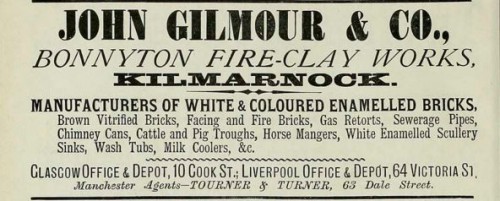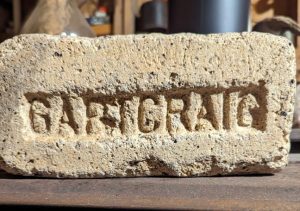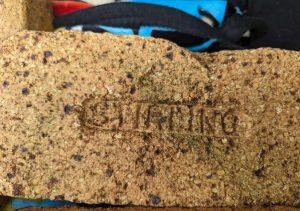Bonnyton Fire Clay Works, Kilmarnock, East Ayrshire.
See also
Southhook Fireclay Works, Dreghorn, Kilmarnock, East Ayrshire.
See also
Shawsrigg Fireclay and Enamelling Company, Larkhall, North Lanarkshire.
Southhook Fireclay Works – Dreghorn – The works was on the site of Southhook Colliery No. 1 Pit, which provided the fireclay. Slater’s Directory states that John McKnight & Co. owned the works from 1889 to 1893, but by 1904 the works had been incorporated as the Southhook Fireclay Company Ltd. Firebricks, glazed sewage pipes, and conduits for electrical cables formed the main products initially. In the 1930s the name changed to Southhook Potteries Ltd., and the company bought Bonnyton Fireclay Works which nearly doubled their capacity. Bonnyton had started prior to 1882 when it was owned by John Gilmour & Co., who had managed the Hillhead Fireclay Works before selling it to J. & M. Craig in 1867. The owners had become Gilmour, Morton & Co. by 1893 up to the 1914 war. Bonnyton Works was closed in the early 1970s and the site was cleared by 1973.
Among the many other smaller brickworks and mines in Ayrshire, the following produced fireclay or bauxitic clays, and most made some firebricks or refractory products such as chimney cans, and baby bricks for domestic fireplaces and stoves. Source Kenneth W Sanderson.
1876 – 1889 – The 1985 publication ‘A survey of Scottish brickmarks’ suggests J Gilmour and Co operated from 1876.
20/02/1883 – The London Gazette – The Bankruptcy Act, 1869. In the London Bankruptcy Court. ln the matter of a special resolution for liquidation by arrangement of the affairs of John Gilmour, Gavin Anderson, James Wood, and Allan Gilmour, trading together in copartnership under the style or firm of the Maryport Hematite Iron Company, as Iron Makers at Maryport, in the county of Cumberland, as Iron Ore Proprietors at Moor Row, Frizington, and Crossgill, all in the said county, and as colliery owners and brick manufacturers at or near Maryport aforesaid and as colliery owners at Bolton Colliery, Mealsgate, in the said county, the said John Gilmour -and Gavin Anderson also trading together (apart from the said James Wood and Allan Gilmour) at Bonnyton Colliery and Fire Clay Works, Kilmarnock, in the county of Ayr in Scotland, under the style or firm of John Gilmour and Company, the said John Gilmour also trading (apart from the said James Wood and Gavin Anderson) in co-partnership with the said Allan Gilmour and John Hendrie the younger, of the Union Bank, Galston, in the county of Ayr, Bank Agent, and Joseph Gilmour, of Rose Bank Cottage, Crooked Holm, in the said county of Ayr, Colliery Owner, at Burnbank and Goatfoot, near Galston aforesaid, as Coalmasters under the style or firm of Boyd Gilmour and Company, the said John Gilmour, John Hendrie the younger, and Joseph Gilmour being trustees of Boyd Gilmour, late of Galston aforesaid, colliery proprietor, deceased, and the said Allan Gilmour being also a trustee of the said Boyd Gilmour, deceased, and likewise trading in his own right, the said Gavin Anderson and James Wood also trading (apart from the said John Gilmour and Allan Gilmour) in copartnership with Robert Goudie, of 14, Alloway-place, Ayr, in the said county of Ayr, Solicitor, Henry Leek, of Hollybush, Dalrymple, in the said county of Ajr, Gentleman, George Robb, of 17, Scott Street, Glasgow, in the county of Lanark, Carting Superintendent, Jane Lovell,of Norton, near Malton, in the county of York, Spinster, and William John Roseby, of Commercial-buildings, Leeds, in the said county of York, Commission Agent, at Lincoln, in the county of Lincoln, as Iron Ore Merchants, under the style or firm of the Mid-Lincolnshire Iron Company, the said James Wood also trading with Adam Wood, of Portland Villa, Troon, in the said county of Ayr, at Galston aforesaid, as Coalmasters, in copartnership, under the style or firm of the Gauchalland Coal Company, the said James Wood and Allan Gilmour also trading in copartnership with the said Joseph Gilmour and Daniel Gilmour, of Rosebank Cottage aforesaid, at Gilminscroft Colliery, Auchinleck, in the said county of Ayr, as Coalmasters, under the style or firm of Gilmours, Wood, and Anderson, the said Allan Gilmour also trading (apart from the said James Wood and Gavin Anderson) in copartnership with the said John Gilmour, John Hendrie’ the younger, and Joseph Gilmour, at Burnbank and Goatfoot aforesaid, as Coalmasters, under the said style or firm of Boyd Gilmour and Company, and also lately trading in his own name, as Coalmaster, at Portland Colliery, near Kilmarnock aforesaid, and now trading in copartnership with Allan Gilmour the younger, at Portland Colliery aforesaid, as Coalmasters, under the style or firm of Allan Gilmour, the said John Gilmour, Gavin Anderson, James Wood, and Allan Gilmour respectively not being resident in England, but residing as follows: the said John Gilmour at Elm Bank, in Kilmarnock aforesaid, the said Gavin Anderson at Tremolesworth, in Kilmarnock aforesaid, the said James Wood at Portland Villa, Troon, and Skeldon House, Dalrymple, both in the said county of Ayr, and the said Allan Gilmour residing at Wood End House, near Kilmarnock aforesaid.
14/11/1883 – Glasgow Herald – To be sold by private tender. Bonnyton Fire Clay Works, Kilmarnock with going colliery belonging to the trust estate of John Gilmour& Co, together with the machinery, plant and utensils connected therewith …
Below – 1886 – Advert Gilmour & Son, Bonnyton Fireclay Works.

1886 – Anderson, Gilmour & Co, Bonnyton Fireclay Works, Kilmarnock. Office 10 Cook St, Glasgow.
23/03/1886 – Ayr Observer – Sheriff Court. At this Court on Monday John Neill or Wood, and John Duncan, two young lads, aged 15 and 16 years, employed as labourers at Bonnyton Brickwork, were charged with having there, on the 13th inst., rather severely assaulted a fellow worker named William Tanner, with whom they had a quarrel. They pleaded guilty and were fined – Duncan in 30s, or 14 days imprisonment, and Neill in 20s, or 10 days’ imprisonment.
25/09/1888 – Glasgow Evening Citizen – The International Exhibition – John Gilmour & Co of Kilmarnock contribute many specimens of enamelled bricks, sinks, tubs and sewage pipes and traps as well as ornamental vases and chimney cans.
1890 – 1891 – John Morton, fireclay manufacturer, (of John Gilmour & Co) 10 Cook Street, Glasgow and Bonnyton Fireclay Works, Kilmarnock. Res Lonsdale, Portland Road. (Note – SBH – Could this John Morton be the son of John Morton who operated the Moorfield Tileworks?)
13/01/1890 – The Scotsman – A reference to Mr John Morton, Bonnyton Fire Clay Works, Kilmarnock – County council elections
1891 – Messrs John Gilmour & Co., Manufacturers of Bricks and Tiles, &c., 10, Cook Street, S.S., Glasgow.
A firm engaged in the fire-clay business, which is, moreover, possessed of its own coal-pits, may be assumed to be in the enjoyment of an exceptionally important trade, and to carry on operations upon an unusually extensive scale.
Such is certainly the case as regards Messrs. John Gilmour & Co., whose pits and fields are at Bonnyton, Kilmarnock, and whose Glasgow Office and depot are at No. 10, Cook Street, South Side. This firm — an old-established one — was founded by Mr John Gilmour, whose name it perpetuates. He, some years ago, was succeeded by Messrs. John Morton and James Parker. These gentlemen, though still retaining the name of the founder, are now the only active partners in the concern. Under their control, the business, which from the first has been an important one, has attained more considerable dimensions, till now it is about the most notable of its class in the whole country, and is still developing in a remarkable degree. The partners appropriately divide the administrative work, Mr Parker attending to the productive branch of the trade at Bonnyton, while Mr Morton manages the distributive department in Glasgow. Effective supervision in both branches is thus secured.
Every description of fire-clay goods, both useful and ornamental, is manufactured by the firm, including white and coloured enamelled bricks and tiles, enamelled kitchen and scullery sinks, enamelled washtubs, enamelled wash-out closets, facing and fire bricks, chimney cans, sewerage pipes, vent linings, oncomes, flooring tiles, cattle troughs, horse mangers, &c. The mere enumeration of this formidable list will help to give a notion of the diversity of purposes to which fire-clay is now applied and the varied forms of manufacture which its extended use has called into existence. In fact, the sanitary importance nowadays of this material cannot be overestimated. It is non-corrosive, cleanly, and in certain forms handsome.
There are few firms, of course, which manufacture it so comprehensively as Messrs. John Gilmour and Co., and it must be borne in mind that few possess such remarkable facilities. Also, must it be remembered that the possession of these facilities, and the fact that they are themselves distributors as well as pit and field owners and manufacturers, enable them to supply all kinds of fire-clay requisites at first cost. Hence they have an immense advantage over mere traders, and consequently, their trade connections are very extensive.
At their Bonnyton Works, several hundred hands are employed, but for the present, we are concerned not so much with these as with the Glasgow branch, where goods are stored and thence despatched all over the country. These premises are admirably suited to the requirements of the firm’s business. A railway runs almost overhead, and the arches form the best possible stores for the finer sort of bricks, &c. Moreover, their yard is almost enclosed with buildings wherein other goods are stored in immense quantities, and the stock is as diversified as it is great.
1891 – Invoices – John Gilmour & Co, Bonnyton Fireclay Works, Kilmarnock. 10 Cook Street, Glasgow.
Below – 1895 – Bonnyton Fireclay Works.

1896 – 1897 – John Morton, brickmaker, 10 Cook Street. Res, St Hilliers, Kilmarnock.
Below – 26/08/1899 – Glasgow Herald – New joint-stock companies – Gilmour Morton & Co Limited, 188 St Vincent Street, Glasgow to acquire as a going concern the business assets of the firms of Gilmour, Anderson & Co, Kilmarnock and John Gilmour & Co, Glasgow and to carry on the business of coalmasters and fireclay manufacturers etc. Capital £30,000.

Below – Oct 1899 – The British Clay Worker – Fire at Bonnyton Fireclay Works on 28/09/1899.

1901 – Directory of clay workers – Gilmour, Anderson & Co, 8 and 10 Cook Street, Glasgow and Bonnyton Works, Kilmarnock, Ayrshire.
Below – 1908 – Bonnyton Fireclay Works.

Below – 17/08/1908 – The Scotsman – Bonnyton Colliery and Fire Clay Works – Gilmour, Morton & Co Ltd in liquidation … To sell the entire stock of 400,000 enamelled bricks and fire clay goods and 2000 tons shale coal belonging to the above estate on a date about 25th August at Bonnyton Works, Kilmarnock.

1911- 12 – Southhook and Shawsrigg Fire clay Co Ltd, Bonnyton Works, Kilmarnock.
23/10/1914 – Kilmarnock Herald – Kilmarnock Company’s successful appeal. In the second division of the Court of Session on Wednesday, before the Lord Justice Clerk and the Lords DXundas and Salveson, an appeal was heard in connection with an action which was raised in the Glasgow Sheriff Court at the instance of the Southhook and Shawsrigg Fireclay Company Limited, Bonnyton Works, Kilmarnock against Thomas Bell and Sons and Co, 6a Templedale Street, Liverpool for the payment of £231 8s 2d, the amount of the account for white enamelled bricks supplied. The pursuers contracted to supply the defenders with 40,000 bricks f.o.b Glasgow for shipment to Canada. The first shipment per the Saturnia was paid for, but the second and third per the Letitia and Athenia were not, the grounds of refusal to pay being that the bricks were not conform to contract. The defenders counterclaimed for £250 for loss on the contract. The contract was constituted by correspondence. The pursuer’s case was that the contract was conditioned by their stipulation that they accepted no responsibility for claims on account of quality and quantity after despatch and that the defenders could inspect the bricks at the factory or at Glasgow prior to shipment. The defenders’ case was that the stipulation was not agreed to, that the bricks were bought by sample and that they were not conform to sample when they reached Canada. Sheriff-Substitute Lyell adopted the defenders’ view and held the defenders were not barred from maintaining their defence by having refused or failed to inspect the bricks at the factory or at Glasgow, and that the counterclaim was competent and relevant. The pursuers appealed. The Court recalled the judgment of the Sheriff Substitute, repelled the references as irrelevant. and gave the pursuers a decree for the sum sued for with expenses in both courts, holding that the stipulation referred to was part of the contract.
1923 -24 – Southhook and Shawsrigg Fire clay Co Ltd, Bonnyton Works, Kilmarnock.
1930s – The 1985 publication ‘A survey of Scottish brickmarks’ suggests that Southhook Potteries took over the works c.1930s and operated them until closure.
Below – 12/12/1935 – Dundee Courier – Company history. The Company which was incorporated as a private company in November 1935, under the title Bonnyton Potteries Limited, was converted into a public company on 2nd December 1935 and has agreed to acquire from the Kilmarnock Trust Limited (now voluntary liquidation) as of 31st July 1936, the business hitherto carried on under the name of Southhook Potteries Limited, excluding an unremunerative section of the business known as Shawsrigg Works. In addition, the Company has agreed to acquire outright my interests in certain Patents which have hitherto been operated by the Vendor Company on a profit-sharing basis. The business was founded in 1901, and a reputation for quality and service has been built up amongst its customers for fireclay sanitary ware of all descriptions, glazed blocks and tiles, sewage pipes, fire bricks, facing bricks and building bricks. The main Fireclay Works known as the Bonnyton Works are situated at Kilmarnock, and the Company also owns at Southhook, some 2 1/2 miles distant, a lease of the property from which its raw materials are obtained. This property is directly connected with Bonnyton Works by railway, and the available supplies of clay are estimated sufficient to meet the Company’s requirements for over thirty years. At Southhook the Company also has works suitably equipped for the manufacture of fire bricks and building bricks. The productive capacity of the business has been steadily increasing during the past few years and the Company now owns one of the most modern and efficient fire clay works in the United Kingdom. The first rotary gas-fired kiln to be installed in this county was erected at Bonnyton Works in 1925, and after an experimental period proved so successful that a second kiln was installed in 1930. At these works, there are also a number of Newcastle muffle kilns, which are in first-class condition. The Company’s products are supplied to Government Departments and to numerous private undertakings and public authorities at home and abroad. An extensive and increasing business in certain lines which the Company specialises in is expected to accrue from Municipal and other Housing Schemes which are now in progress or under consideration.

Below – 1938 – Bonnyton Fireclay Works.

Below – 1944 – 1969 – Bonnyton Fireclay Works.

09/01/1947 – The Scotsman – £350 damages for a hand injury. Reversing a decision of Lord Mackintosh the First Division of the Court of Session yesterday found for the pursuer in an action in which James Barnes, machinist, 24 Hillmoss, Kilmaurs, Ayrshire, sued the Southhook Potteries, Ltd, Bonnyton Works, Kilmarnock. On June 13, 1944, the pursuer while engaged in operating a brick pressing machine at the defender’s works at Southhook Brickfield, Crosshouse, by Kilmarnock, sustained an injury to his right hand. Lord Mackintosh held that the pursuer had materially contributed to the accident through his own misconduct in disobeying an order given to him and going to the pressing machine at a time when he was not supposed to be there. The Division yesterday held that the defenders had failed to establish their defence that an order had been given to Barnes terminating his right to continue at the pressing machine. Their Lordships made an award of an agreed on sum of £ 350 in name of damages.
Early 1970‘s – The 1985 publication ‘A survey of Scottish brickmarks’ suggests the works closed around this time.
Below – unknown date – Southhook and Shawrigg, Bonnyton Works product catalogue.


















